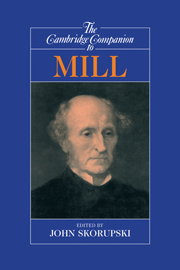Book contents
- Frontmatter
- Introduction
- 1 Mill on language and logic
- 2 Mill, mathematics, and the naturalist tradition
- 3 Mill on induction and scientific method
- 4 Mill, phenomenalism, and the self
- 5 Mill on religion
- 6 Mill on psychology and the moral sciences
- 7 Mill's utilitarianism
- 8 Mill's political economy
- 9 Civilization and culture as moral concepts
- 10 Democracy, socialism, and the working classes
- 11 The subjection of women
- 12 Mill and the Classical world
- 13 The reception and early reputation of Mill's political thought
- 14 Mill in a liberal landscape
- Guide to further reading
- Bibliography
- Index
1 - Mill on language and logic
Published online by Cambridge University Press: 28 May 2006
- Frontmatter
- Introduction
- 1 Mill on language and logic
- 2 Mill, mathematics, and the naturalist tradition
- 3 Mill on induction and scientific method
- 4 Mill, phenomenalism, and the self
- 5 Mill on religion
- 6 Mill on psychology and the moral sciences
- 7 Mill's utilitarianism
- 8 Mill's political economy
- 9 Civilization and culture as moral concepts
- 10 Democracy, socialism, and the working classes
- 11 The subjection of women
- 12 Mill and the Classical world
- 13 The reception and early reputation of Mill's political thought
- 14 Mill in a liberal landscape
- Guide to further reading
- Bibliography
- Index
Summary
INTRODUCTORY
Mill's theory of meaning is couched in the syntax of syllogism rather than that of modern, post-Fregean logic, whereas the advance of logic has been a pivotal element in the story of twentieth-century philosophy. But this should not blind us. A Millian semantics and epistemology of logic can be stated as well in a modern as in a syllogistic framework; in fact the modern framework allows it to be stated more perspicuously. Mill's doctrine of connotation and denotation and his thoroughgoing empiricism remain robust. And it was as a defender of empiricism in the epistemology of science - including logic and mathematics - rather than as a contributor to logic or science as such that he wrote.
The real criticism of Mill remains much the same as that made by his nineteenth-century critics. He does not reflect enough about the content of his empiricism and its overall coherence. The same criticism, it is true, can be made of many contemporary naturalists. We shall come back to it in section VI. But first the outlines of Mill's position must be set down and some influential misconceptions set aside.
Mill is an empiricist in that he holds that no informative assertion about the world is a priori. In the System of Logic he distinguishes between Verbal' and 'real' propositions, and between 'merely apparent' and 'real' inferences. The assertion of a purely verbal proposition conveys no information about the world, though it can convey information about the language in which the assertion itself is couched. Similarly, a merely apparent inference moves to no new assertion - its conclusion has been literally asserted in its premises.
- Type
- Chapter
- Information
- The Cambridge Companion to Mill , pp. 35 - 56Publisher: Cambridge University PressPrint publication year: 1998
- 4
- Cited by

